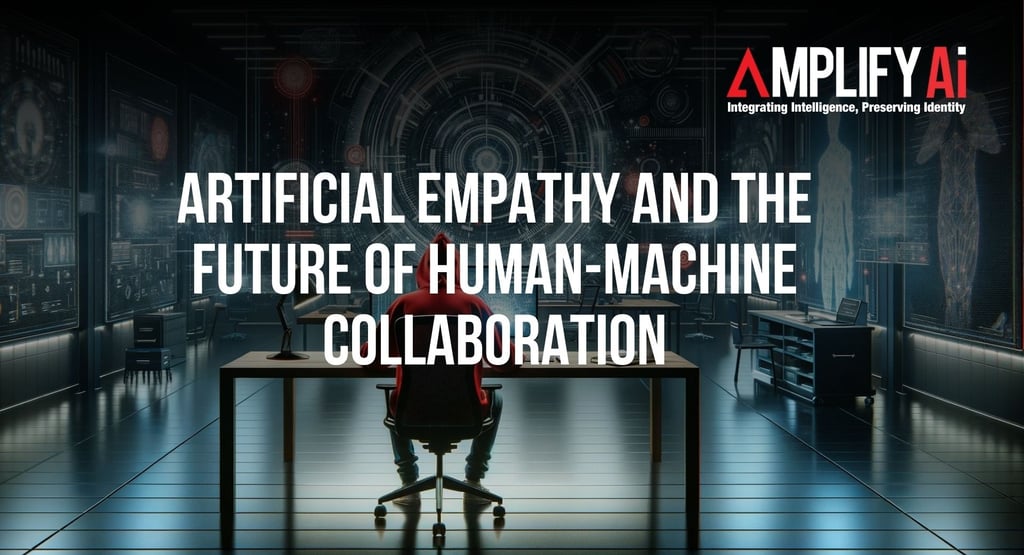Artificial Empathy and the Future of Human-Machine Collaboration
Ronsley Vaz
4 min read


Imagine a world where machines can understand and respond to our emotions with the same empathy as human beings. This is the concept of artificial empathy, a transformative technology that has the potential to revolutionise various industries. In this article, we will explore the fascinating world of artificial empathy and its impact on the future of human-machine collaboration.
Understanding Artificial Empathy
Artificial empathy is a remarkable technological advancement that enables machines to comprehend and respond to human emotions. Although it may sound like something out of science fiction, researchers have made significant strides in this field. AI tools can decode human emotions and intentions by analysing various psychological and behavioural cues, leading to more profound and meaningful communication and collaboration. It's crucial to emphasise that artificial empathy is not intended to replace human empathy but rather to augment it. This creates a dynamic synergy between humans and machines, fostering a deeper understanding and connection.
With the ability to decipher human emotions, AI tools can facilitate more effective interactions in various scenarios. For instance, in customer service, imagine a virtual assistant who can truly empathise with customers by analysing their tone of voice, word choice, and even body language. This personalised and empathetic response can greatly enhance customer satisfaction and loyalty. Similarly, artificial empathy holds immense potential in fields like mental health support. By providing a non-judgmental and unbiased listening ear, AI tools can assist individuals struggling with mental health issues, offering them a sense of understanding and support. It's crucial to address ethical considerations and privacy concerns to ensure the responsible development and use of artificial empathy technologies in sensitive areas like mental health. Artificial empathy is a powerful tool to enhance human-machine collaboration and create more empathetic and effective interactions.
Transforming Customer Service
Artificial empathy revolutionises customer service by allowing AI-powered virtual assistants to understand and empathise with customers' emotions and concerns. Imagine calling a customer helpline and having the virtual assistant analyse your tone of voice, word choice, and body language to gauge your frustration or concern accurately. With this deep understanding, the AI tool can respond with empathy and provide personalised solutions, creating a more satisfying and supportive customer experience.
Companies like Amazon and Apple have already recognised the value of artificial empathy in customer service. These companies have seen improvements in customer satisfaction and loyalty by implementing AI-powered virtual assistants that can analyse and respond to customers' emotions. Customers feel heard and understood, strengthening the brand's connection and trust. This level of personalised support sets these companies apart from their competitors and contributes to a positive overall customer experience.
Improving Mental Health Support
Artificial empathy has the potential to revolutionise mental health support by analysing emotional and behavioural patterns. These AI tools offer personalised assistance, providing a non-judgmental listening ear to individuals struggling with mental health issues. This can augment traditional therapy methods, helping individuals feel understood and supported.
One advantage of artificial empathy is its accessibility, as AI tools can be available 24/7, unlike human therapists. This ensures continuous care and support, especially for those who are hesitant to seek help or face barriers to traditional therapy. Additionally, artificial empathy creates a safe space for individuals to express themselves without fear of judgment, leading to deeper self-reflection and emotional exploration. However, ethical considerations and privacy concerns must be addressed to safeguard patient data and ensure inclusivity while maximising the benefits of artificial empathy in mental health support.
Enhancing Communication and Collaboration
Effective communication and collaboration are essential in any industry, and artificial empathy can bridge the gap between humans and machines to facilitate seamless interactions. AI tools that accurately interpret human emotions and intentions enable better teamwork, negotiation, and facilitation. Industries such as healthcare, finance, marketing, and HR can greatly benefit from integrating artificial empathy into their processes, improving efficiency and outcomes.
In healthcare, AI tools can analyse patients' emotions to enhance the doctor-patient relationship. By understanding subtle cues in facial expressions and vocal tone, these tools can provide personalised and empathetic care, improving patient satisfaction. Similarly, in finance, AI-powered virtual assistants can tailor responses based on customers' emotional states, improving customer service and loyalty. In marketing and HR, artificial empathy can improve communication and collaboration by interpreting employees' emotions and intentions, facilitating proactive problem-solving and enhancing team performance. It is crucial to address ethical considerations and privacy concerns and ensure responsible development and use of artificial empathy technologies to create a future where humans and machines work harmoniously.
Ethical Considerations and Future Implications
Artificial empathy is revolutionising industries by enabling AI-powered virtual assistants to understand and empathise with customers' emotions. These assistants can analyse tone of voice, word choice, body language, facial expressions, and gestures to provide personalised and empathetic responses. In healthcare, AI tools can enhance mental health support by detecting signs of distress and providing empathetic listening and real-time feedback in therapy sessions. However, ethical considerations such as privacy and responsible development must be addressed, and ongoing exploration is needed to understand the future implications of artificial empathy on society and human-machine interactions.
The integration of artificial empathy into various industries has the potential to improve customer experiences and mental health support greatly. AI tools can provide personalised solutions and empathetic support by analysing emotional cues. However, ethical guidelines and regulatory frameworks must address privacy concerns and prevent misuse or harm. Ongoing exploration and discussion are essential to fully understand the implications of artificial empathy on society and human-machine interactions.
Artificial empathy holds tremendous potential in transforming various industries and enhancing human-machine collaboration. Machines can provide more personalised and empathetic experiences by understanding and responding to human emotions. However, it is crucial to approach the development and use of artificial empathy technologies with responsibility and ethical considerations. As we continue to push the boundaries of AI, let us embrace the power of artificial empathy to create a future where humans and machines work together harmoniously.
Subscribe to the podcast
Subscribe now to "Amplify Ai" and let's set sail together on this exciting voyage towards business growth and success.



